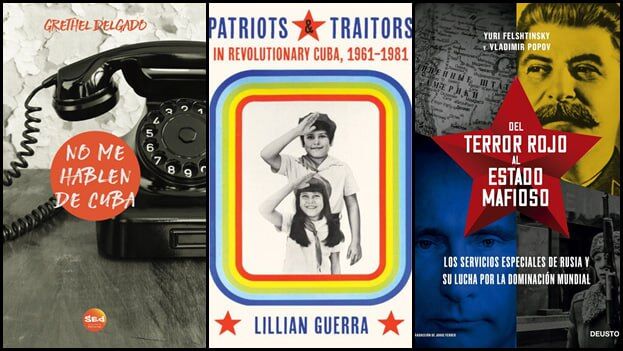
![]() 14ymedio, Havana, 28 February 2023 — Two events marked the discussions on Cuban literature this February: the Havana International Book Fair and the controversy over the documentary El caso Padilla (2022) [The Padilla Case], by Pavel Giroud. Cuban authors, editors and translators also dealt with issues such as the return to the Island from exile and the Soviet imprint on the current Russian mafia.
14ymedio, Havana, 28 February 2023 — Two events marked the discussions on Cuban literature this February: the Havana International Book Fair and the controversy over the documentary El caso Padilla (2022) [The Padilla Case], by Pavel Giroud. Cuban authors, editors and translators also dealt with issues such as the return to the Island from exile and the Soviet imprint on the current Russian mafia.
Like a “cursed return” is how Grethel Delgado described the story told by her novel Do not talk to me about Cuba (Suburbano). 14ymedio published the first chapter [link is in Spanish]. That return “without any patriotic concept” to “see those she left behind” imprints “very bitter taste” on the narrator, along with regret for having made a too painful a journey to her roots.
The detective novel Asesinato en el Bosque de La Habana (Atlantis) [Murder in the Havana Forest], by Rigoberto Menéndez, deals with the Arab, Lebanese, Syrian and Palestinian communities in Cuba in 1940. In the words of its author, the text uses a crime to investigate a “cosmopolitan, plural Havana, inhabited by immigrants from all latitudes.”
With Patriots and Traitors in Revolutionary Cuba 1961-1981 (Pittsburgh Press), published in English, University of Florida professor Lillian Guerra examines “the structures of hegemony and control” with which Fidel Castro secured his power in the early years of the Revolution. To support her reasoning, Guerra points out that since 1959 the dichotomy “patria o muerte” [homeland or death] was imposed on Cuban society, which demarcated the division between the supporters of the regime and those who, since their “betrayal,” were stripped of all social and political weight.
Many readers have missed a reissue of Fuera del juego (1968) [Out of the Game], by Heberto Padilla, regarding the controversy that numerous intellectuals and artists have sustained over the documentary The Padilla Case. No publisher, on or off the island, has alluded to a possible update of the work to include the impact of Giroud’s film on the current reading of the collection of poems.
The Cuban writer and specialist in Russian literature Jorge Ferrer, resident in Barcelona, announced the publication of the volume Del terror rojo al Estado mafioso (Deusto) [From Red Terror to the Mafioso State*], by Yuri Felshtinsky and Vladimir Popov. The volume, translated from Russian into Spanish by Ferrer, addresses the work of Russia’s special services as part of a “struggle for world domination.”
Also published about the culture of this country was La última artista soviética (Godall) [The Last Soviet Artist], by the Russian painter Victoria Lomasko, with a translation by the Cuban poet and essayist Ernesto Hernández Busto. According to the presentation note of the volume, it is the “involuntary testimony of how the intolerance of a regime can truncate the wishes of this artist and turn her, despite herself, into a symbol of struggle.”
This month, the critic Jorge Luis Arcos was awarded the Franz Kafka Essay Prize for his book El castigo (Relato caleidoscópico) [The Punishment (Kaleidoscopic Story)], a “fundamental contribution,” according to the jury, to the knowledge of the work of the poet Lorenzo García Vega. Another prize winner is the French translation of the novel Los caídos [The Fallen] by the writer Carlos Manuel Álvarez, recipient of the Prix Carbet de la Caraïbe et du Tout-Monde 2023, which annually distinguishes the best Caribbean book published in French or Creole.
This February, Cuban readers went to the La Cabaña fortress and other spaces in Havana to participate in the International Book Fair. During the event, which was characterized by the absence of young people and poor editorial offerings, the Literary Criticism prizes were awarded, which was obtained for several books, including El año que nieve, by Rubén Rodríguez, Subsuelos, by Leymen Pérez, and Hierro, by Carlos Celdrán.
The official press itself was critical of the figures offered by the Cuban Book Institute. According to this institution, only 710,455 copies were sold – a quantity that Cubadebate defined as “considerable” – although they did not reveal the number of new titles printed by state publishers. The average cost of each book, it says, was 17 pesos, but the real cost of the books, verified by 14ymedio, was well above that price.
Readers also found very few attractive titles. At none of the stalls was it possible to buy Personas decentes (Tusquets), a crime novel by Leonardo Padura that occupies the best-seller lists in Spain and Latin America, or La niña alemana [The German Girl], the novel by Armando Lucas Correa that as of this month had sold one million copies worldwide.
*Translator’s note: The book is scheduled to be released in English in September 2023.
________________
COLLABORATE WITH OUR WORK: The 14ymedio team is committed to practicing serious journalism that reflects Cuba’s reality in all its depth. Thank you for joining us on this long journey. We invite you to continue supporting us by becoming a member of 14ymedio now. Together we can continue transforming journalism in Cuba.
